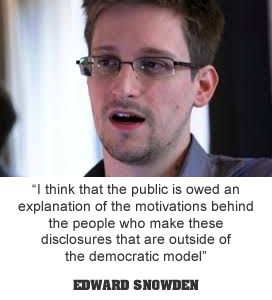Treeper Admin Stella has really done a remarkable job sharing articles about this entire NSA leaker issue. Here are some links she shares which are some of the most engaging considerations and help to frame the various aspects for thought.
I’ll be the first to admit I’m just not up to speed on the various nuance surrounding this intelligence story. I’m not at all OK with the NSA, or anyone else, collecting or storing information on private communication for *possible* use at another, albeit later, time. It just strikes my gut as Big Brother with an agenda, not to mention a violation of the 4th amendment.
So back to the information articles that Stella is researching/sharing:
 From Legal Insurrection: Edward Snowden, the now-former NSA contractor who leaked secret documents to The Washington Post and the Guardian, said he didn’t want to become the story. “I don’t want public attention because I don’t want the story to be about me. I want it to be about what the US government is doing,” he told The Guardian.
From Legal Insurrection: Edward Snowden, the now-former NSA contractor who leaked secret documents to The Washington Post and the Guardian, said he didn’t want to become the story. “I don’t want public attention because I don’t want the story to be about me. I want it to be about what the US government is doing,” he told The Guardian.
But Edward Snowden dumped a bunch of documents, made a lot of claims, and then fled. He’s the only one who can clarify or confirm the statements he’s made, or demonstrate his comprehension for what’s in the documents he leaked, and he’s made himself unavailable to do so. The public is trying to collect and digest all the facts, and some still have questions.
So, fair or not, the story turns to Edward Snowden, and to a few of those discrepancies that some in the public are trying to understand. (continue reading)
 #2 from PJ Media – Balancing National Security and Civil Liberties: A Guide to the Debate – The more one learns, the harder it is to reach a conclusion on the vital issue of what trade-offs we should support when it comes to protecting our national security while keeping our civil liberties intact.
#2 from PJ Media – Balancing National Security and Civil Liberties: A Guide to the Debate – The more one learns, the harder it is to reach a conclusion on the vital issue of what trade-offs we should support when it comes to protecting our national security while keeping our civil liberties intact.
It was so much easier in the early days of the Cold War. The forces of the American Left ludicrously charged that America had gone fascist because the Truman administration had created an employee security program that set up loyalty boards to inquire whether government employees belonged to the Communist Party or any of its myriad front groups. Scores of government employees resigned to avoid being questioned, and others were dismissed after hearings.
There were abuses of the program, but one point had been made. The U.S. government did not owe anyone a job, and those who were enemies of our country had a right to be fired. The disputes were over whether or not those who were innocent were subject to dismissal only because of their opinions. (continue reading)
#3 From New Republic – A Tale Of Two NSA Leaks – Former NSA contractor Edwards Snowden sure does know how to change the subject. Only a few days ago, everyone was talking about the excesses of leak investigations. But now, as a result of his set of disclosures to the Guardian and The Washington Post, we’re back on the surveillance state—and the dangers of the leaks themselves.
The New York Times complains in an editorial that “most lawmakers did not know the government was collecting records on almost every phone call made in the United States or was able to collect anyone’s e-mail messages and Internet chats.” The Washington Post describes President Barack Obama as facing “a rash of disclosures that have revealed the extent to which his administration . . . has [cast] a massive electronic surveillance net . . . within the United States that appears to have gathered data on almost anyone with a computer or phone.” Maureen Dowd, writing in the Times, asks with her characteristic snark, “Now that we are envisioning some guy in a National Security Agency warehouse in Fort Meade, Md., going through billions of cat videos and drunk-dialing records of teenagers, can the Ministries of Love and Truth be far behind?”
[…] We live in extraordinary times when it comes to secrecy and national security. Classified information has never been more vigorously protected; witness the much-criticized efforts by the Obama administration to investigate and prosecute leaks. Yet secrets continue to erupt into the headlines on a regular basis. These fleeting glimpses into the shadow worlds of counterterrorism, counterespionage, and counterproliferation are not always a bad thing. Sometimes, they prompt needed debate; even the White House has said that the president “welcomes the discussion of the trade-off between security and civil liberties” that the Verizon disclosure will produce. Some secret activities may be especially unwise or even illegal, so the proper amount of leaking in a healthy democracy is surely not zero. But it is equally true that, in some cases, exposure of classified information achieves little, while risking much. Snowden’s disclosures so far offer vivid examples of both the good and the bad of national security oversight by individual acts of civil disobedience. (continue reading)